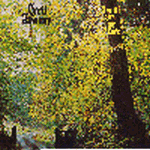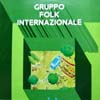"Etchingham Steam Band" (UK Folk 1974-75)
After the formative line up of The Albion Country Band fell apart with a classic album unreleased Ashley Hutchings had of course to continue providing some kind of income to his family. Disenfranchised as he was with the music industry he and his wife the important folk singer Shirley Collins formed an impromptu part-time band to honor existing gig commitments and allow them to continue playing live which then burgeoned into something entirely its own even leading to their playing the Albert Hall in London. This band complemented their bass and vocals with Ian Holder on accordion, Terry Potter and later Vic Gammon on concertina and Shirley hitting a bell laden child's hobby horse for percussion. The name was taken from their home location in Sussex and the fact that the power strikes forced cut outs forcing the band to use steam as an alternative. The name fitted the venture perfectly which was directed entirely towards an English traditional folk music mixing songs with instrumentals. The album collects together various live performances during their short life from 1974 to 1975. By this time Ashley was entirely focused on traditional music and a spin-off Albion Morris troupe had even been formed from his earlier bands.
If you come to wyrd-folk form a purely psychedelic or pagan interest then this album may prove to be not to your immediate taste. However with the benefit of time we can now see this is perhaps one of the artists purest traditional albums being highly evocative and a portrait of a music that was even then old and antiquated. Age is however no statement of quality and it is wonderful that this album sounds so warm and vibrant. The settings for Shirley's voice on such as 'Hard Times Of Old England' and 'Horn Fair' are more alive and joyful than some of her more stark solo material, bringing empathy and warmth that is often quite moving. There is an element of fun and enjoyment here, music made purely for its own sake that comes across listening to it all these years later. Some of the songs like 'Gaol Song' sound very rustic with the kind of lyrics that make younger listeners cringe but do provide an authentic back to the music of country dances from many decades before. All the time there is a balance of musical enjoyment in the community revels and dances contrasted by the despairing living conditions of harshness, injustice and disease that the other of these songs tell of.
On tracks like 'Horn Fair' there is an gentle sensuality, a swaying implied saucy quality that is often lost in modern folk music. Songs like 'Come All You Little Streamers' are literally like being beamed back to an earlier age. The musicians are of absolute top quality being part of the folk music scene so the instrumentation and of course the instrumentals are excellent, being performed in a way that is sympathetic but also second nature to the performers. You can feel the warmth from the audience on songs such as 'Adderbury Wassail Song' and 'Black Joker' that while often short seem to genuinely bring together the performers and audience in a magical way. To lose yourself and get back to the origins of folk music, to the unfetted traditional sound this is a wonderful source. if you enjoy the music of Shirley Collins, Ashley Hutchings or just want to understand the evolution of British folk music this is a minor classic of its kind that repays your interest and provides songs that you will return to over and again.
Personnel:
Shirley Collins: vocals
Ashley Hutchings: tambourine, vocals, acoustic bass
Ian Holder: accordion
Dave Mattacks: drums
Terry Potter: mouth organ
Mel Dean: concertina
Will Duke: concertina
Vic Gammon: banjo, concertina, vocals, melodeon
01. Hard Times of Old England
02. Leapfrog / Young Collins / Shooting
03. The New Rigged Ship / Atholl Highlanders
04. Gaol Song
05. Horn Fair
06. Some Tyrant Has Stolen My True Love Away
07. Come All You Little Streamers
08. Sheep-Shearing / Buttered Peas
09. The Sussex Carol
10. Adderbury Wassail Song
11. Grandmother's Dance / Grandfather's Dance
12. Bonny Kate
13. The Little Gypsy Girl
14. Black Joker
All tracks Trad. arr. Etchingham Steam Band
Tracks 1-4 recorded 1975, Lenzburg Folk Festival, Switzerland
Tracks 5, 7, 14 recorded 1974, Norwich Folk Festival
Tracks 6, 10 recorded December 1975, `Nova Scotia', Bristol
Track 8 recorded October 1974, London
Track 9 recorded December 1974, Cecil Sharp House London
Tracks 11-12 recorded July 1975, Lewes Folk Festival, afternoon session
Track 13 recorded July 1975, Lewes Folk Festival, evening session
 Very rare british folk compilation from 1973, originally released on Windmill. A compilation of obscure British folk from the early '70's including the excellent Folkal Point and Gallery (who had their album issued on Kissing Spell) as well as The Blue Horizon, Blue Water Folk,Combine Harvester, and more. A period artifact.
Very rare british folk compilation from 1973, originally released on Windmill. A compilation of obscure British folk from the early '70's including the excellent Folkal Point and Gallery (who had their album issued on Kissing Spell) as well as The Blue Horizon, Blue Water Folk,Combine Harvester, and more. A period artifact.


















































